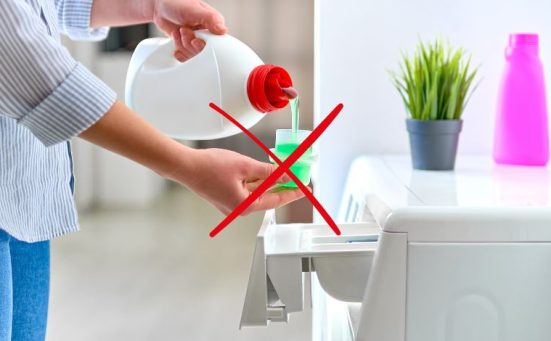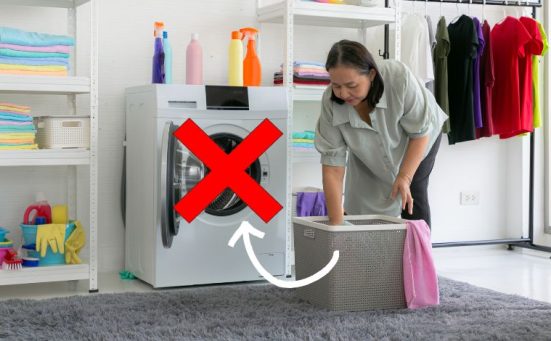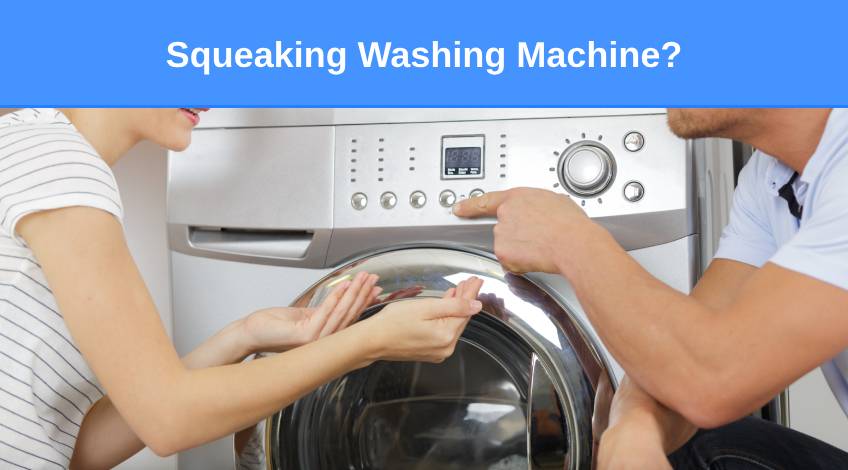
Squeaking Washing Machine? (here’s why & what to do)
If your washing machine has started making a squeaking sound every time you use it, it’s annoying and worrying. As with most things it’s mainly worrying because you don’t understand what’s causing it.
In this article I take a close look at the reasons why your washing machine is squeaking and offer solutions to these issues allowing you to fix this problem quickly and without too much trouble.
Why Is The Washing Machine Squeaking?
There are several reasons why your washing machine might start squeaking which include;
| Probable Cause | Solution |
|---|---|
| It’s A New Washing Machine | Wait for 5 to 10 washes to have been completed |
| Overloading The Drum | Never load more than ¾ of the drum capacity |
| Unlevel Appliance | Adjust the feet and ensure the washer is level |
| Unbalanced Load | Ensure laundry is evenly distributed in the drum |
| Limescale Build Up | Run a hot service wash |
| Defective Door Seal | Inspect and replace the door seal if necessary |
| Components Need Lubricating | Lubricate moving parts |
| Worn Or Defective Drum Support Springs | Check and replace if necessary |
| Drain Pump Issues | Remove and clean the drain pump or replace if necessary |
| Loose Drive Belt | Inspect and replace the drive belt if necessary |
| Defective Shock Absorbers | Check and replace the shock absorbers if necessary |
| High Water Pressure | Adjust the water pressure via the inlet tap |
| Worn Or Defective Bearings | Check and replace the bearings if necessary |
Let’s take a closer look at each of these issues;
It’s A New Washing Machine
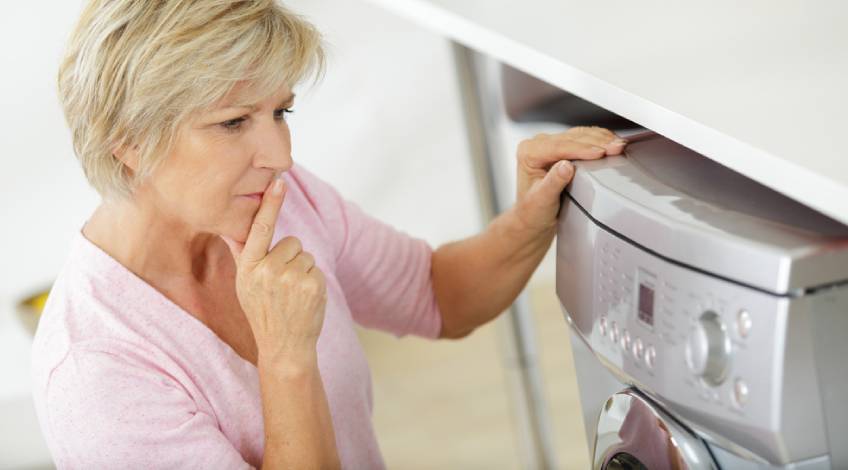
Like many new appliances, the washing machine can squeak for the first few uses after installation. There are several parts that need to wear in slightly to settle down.
Parts like the door seal (gasket), springs and other internal parts need time to settle. You can try lubricating the drum seal (gasket) by rubbing some fabric softener along the bottom of the seal to prevent the seal from catching on the door glass.
Transit Bolts
There’s one crucial part (or parts) that needs to be removed before using your brand new washing machine and that’s the transit bolts. These are used to secure the drum during movement and are designed to prevent any damage to the drum, springs etc whilst the washer is moving.
Once the washer is installed into your home it is vital that you remove the transit bolts before the washer is used. Failing to do so could lead to internal damage to the drum, springs and other internal components.
Leaving the transit bolts in place and running the washer will almost certainly void your manufacturer’s warranty as well.
Overloading The Drum
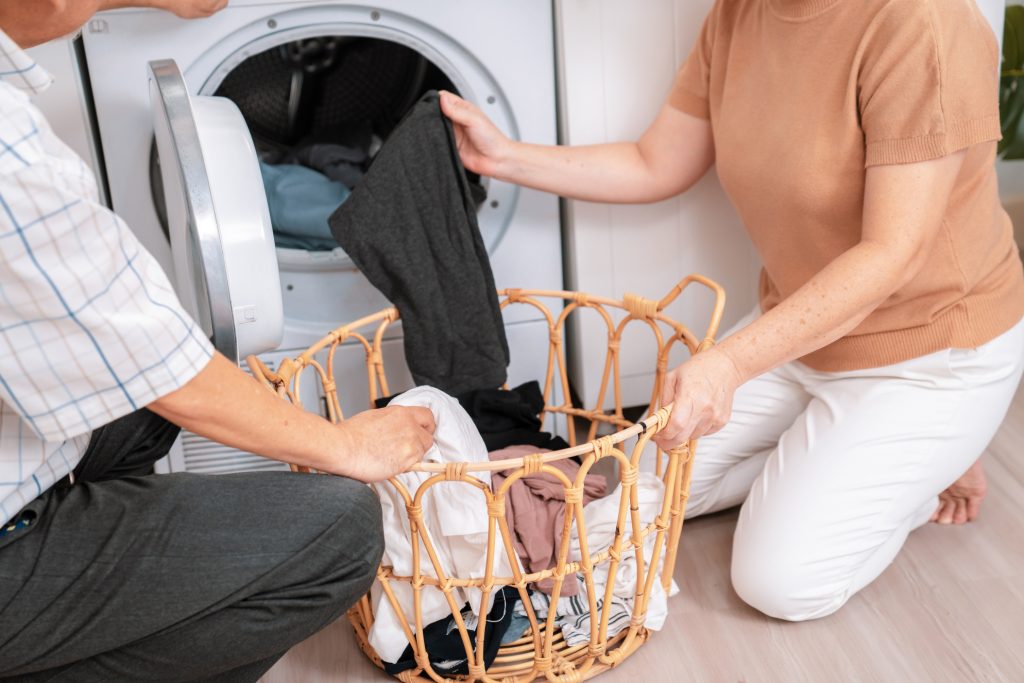
If you cram as much laundry into the drum as possible, you can cause the washer to squeak. Overfilling the drum can cause the drum to spin with greater force than it was designed to do.
This can lead to the drum colliding with internal components causing damage as well as a squeaking sound. Also overloading the drum can lead to some of the washing not getting cleaned properly.
You should never fill the drum to more than ¾ of its capacity. This means an 8 kg washer should have no more than 6 kg of dry laundry placed in it.
Unlevel Appliance
The squeaking noise could be due to the washer not being on a level surface, or the feet haven’t been adjusted correctly. This can cause the washer or some of its components to vibrate leading to that squeaking noise.
You need to ensure the machine is level by placing a spirit level on the top of the appliance and making sure the bubble is in the centre. To achieve this you will need to adjust the feet until the washer is level.
You need to check front to back as well as side to side. You might like to place anti-vibration pads or an anti-vibration mat under the appliance to help prevent too much noise in general when the appliance is running.
Unbalanced Load
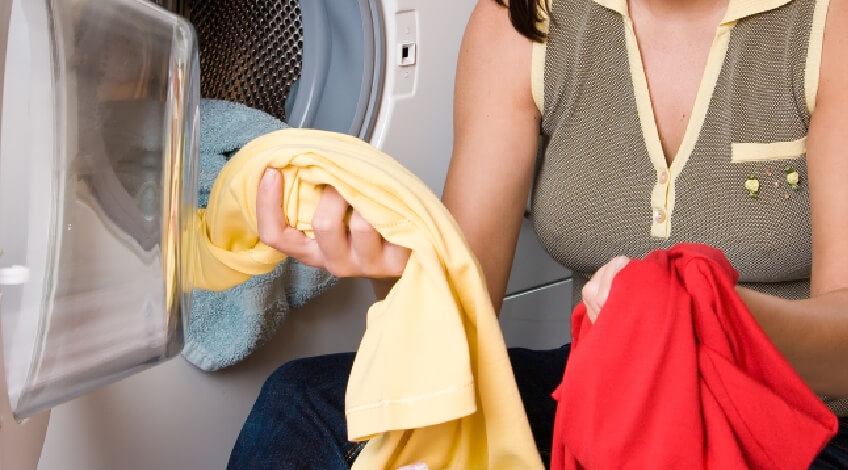
If the wash load inside the drum becomes unbalanced, it can cause that squeaking sound because every time the drum turns, it rubs onto the tub. This is typically caused by loading large items like bed sheets or towels in with smaller items.
The larger item wraps around the smaller items and creates a large ball of laundry which gets stuck on one side of the drum. This means all of the weight is on one side leading to the drum becoming unbalanced.
The solution to this is to always wash larger items separately from smaller items.
Limescale Build Up
In some cases, a build up of limescale can cause the washer to squeak when running. If you live in a hard water area, the minerals in the water can accumulate in the washer at various points forming a hard rock-like substance known as limescale.
This can cause moving parts to rub against the limescale causing the squeaking noise. To combat this and prevent limescale from forming, you should run a hot 90o C service wash at least once a month.
You can either use a commercial washing machine cleaner or 1 to 2 cups of distilled white vinegar to help remove any dirt, soap scum and limescale from the machine.
Defective Door Seal
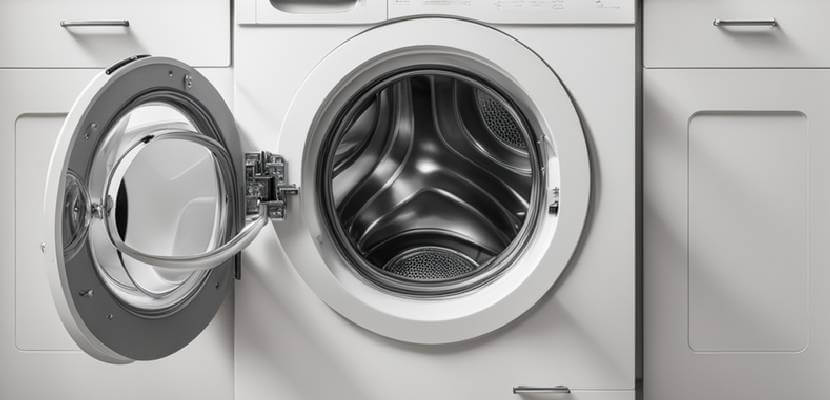
I mentioned earlier about the possibility of a new washing machine squeaking due to the drum seal rubbing on the door glass. Unfortunately this can also become a problem in older machines as well.
As the rubber seal ages it becomes worn and can develop damage which can cause it to fray. Leading to parts rubbing on the door glass or drum as it spins.
You will need to inspect the door seal for any signs of wear or damage and replace it if necessary.
Components Need Lubricating
New washing machines are supplied with all of the working parts lubricated. Over time, the lubricant wears out which can cause that squeaking sound.
Using a suitable lubricant, you need to lubricate the bearings and other moving parts of the appliance. Consult your user manual or contact the manufacturer directly to ensure you use the correct type of lubricant.
Worn Or Defective Drum Support Springs
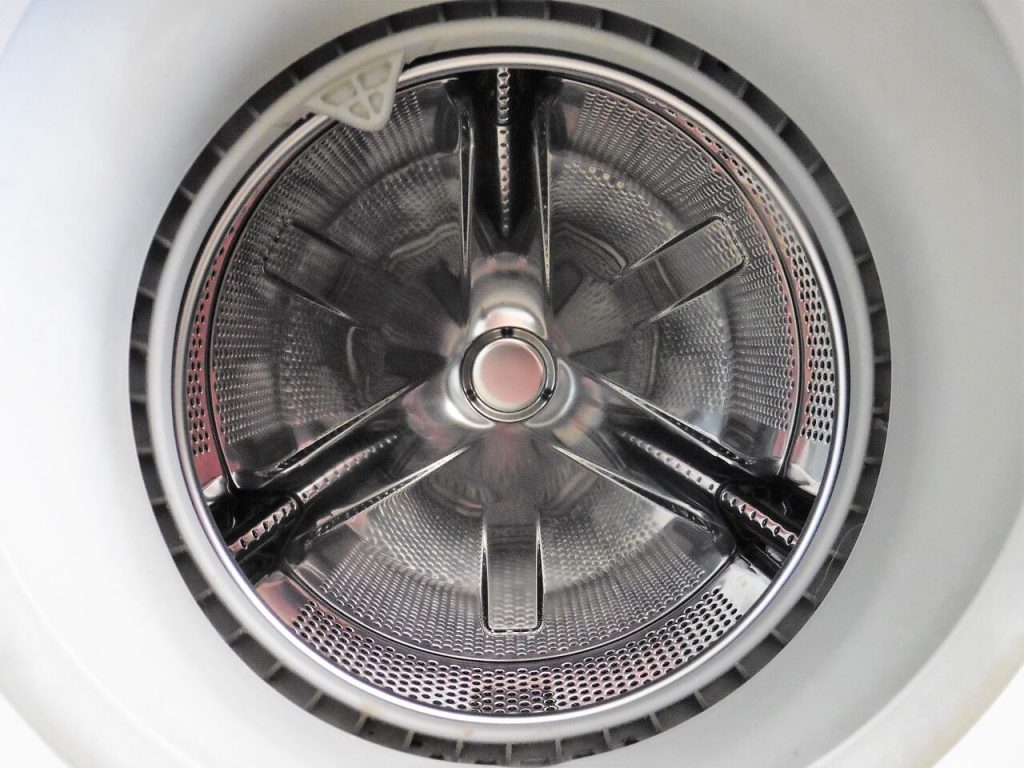
The drum support springs hold the drum up onto the cabinet of the washer. New washing machines tend to not get a squeaking sound due to drum support springs.
But, as the appliance ages, the support springs become worn especially if you are prone to overloading the drum regularly. The springs could overstretch which is the main reason for the squeaking.
In some cases the drum support springs become rusty which can also cause them to squeak. You can often save the springs simply by lubricating them to remove any signs of rust.
If you do need to replace them, a new set will typically cost somewhere in the region of £30 to £45.
Drain Pump Issues
If there are any problems with the drain pump, it could cause that squeaking sound. The drain pump is located at the bottom of the appliance and forces wastewater from the machine.
If there is any accumulated dirt or debris inside the pump, it will cause it to struggle to move the wastewater which could cause that squeaking sound.
To clean the drain pump properly you will need to remove it from the machine. If this is a step too far, I recommend contacting a technician to do this for you.
Loose Drive Belt
The drive belt connects the motor to the drum and is responsible for the drum turning. Just like the fan belt on a car, the rubber drive belt on a washing machine stretches over time.
This can lead to it slipping which creates that squeaking sound. It is also possible that the drive belt has frayed or become damaged which can also lead to it loosening and making that squeaking sound.
It is relatively easy to replace a defective drive belt but it does involve dismantling parts of the appliance. If this is a step too far, I recommend contacting a technician to do this for you.
Defective Shock Absorbers
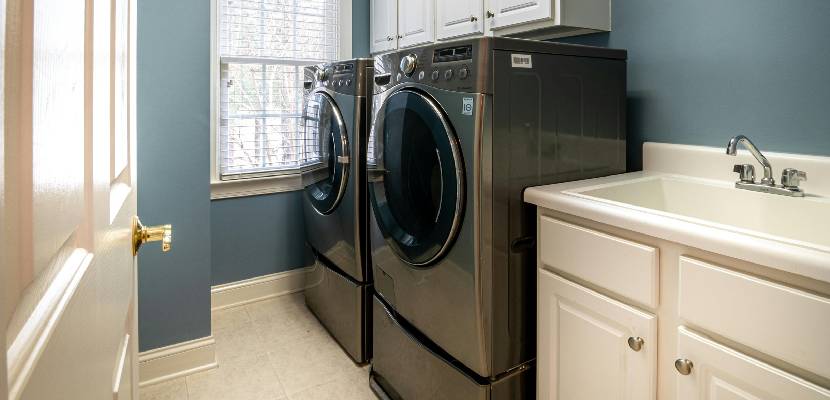
The shock absorbers, or drum suspension legs as they’re also known, can be found at the bottom of the machine and hold the drum in position. Most washers have 2 shock absorbers although there are a few machines that have 3.
In the same way as the drum support springs the squeaking sound is generally a sign that the shock absorbers either need lubricating or are worn and need replacing.
Also just like the drum support springs, shock absorbers aren’t too expensive to replace. However, fitting them can be tricky unless you know what you’re doing. Which is why I recommend getting a technician to do it for you.
High Water Pressure
If the squeaking noise comes after the drum has filled with water directly as it stops filling, it could be due to high water pressure. If you suspect high water pressure is the cause of the squeaking sound, you can adjust the water pressure yourself.
All you need to do is locate the water inlet tap which will be found where the water supply connects to the inlet hose. Turn the blue tap slightly closed and see if this makes a difference.
If you find you can’t quite get it right, I recommend contacting a technician to do it for you.
Worn Or Defective Bearings
The bearings help keep the drum spinning properly. Over time the bearings can become worn or damaged due to overloading the drum or a lack of lubrication. Another cause is not cleaning your appliance regularly.
This can lead to a buildup of dirt, debris, dried detergent and limescale which can cause friction and wear and tear to the bearings. If the bearings are failing, you can expect unusual squeaking noises which become rattling or grinding noises as the bearings wear further.
There might also be unexpected vibrations and there could also be small pieces of metal visible in the drain after the washer has been used.
You can test the bearings by turning the drum by hand and listening. If the drum makes a squeaking or grinding sound, the bearings probably need replacing.
Whilst washing machine bearings are relatively inexpensive parts to buy, fitting them requires a level of skill not usually found in the average DIYer. Which is why I recommend contacting a technician to investigate and replace the drum bearings if necessary.
SEE ALSO: Washing Machine Making A Grinding Noise? (try this)
Frequently Asked Questions
If your washing machine is squeaking it is likely to be because; the machine is new and needs time to settle, the drum has been overloaded, the washer is uneven, the load is unbalanced, there is a buildup of limescale, the door seal is defective, the internal components need lubricating, the drum support springs or shock absorbers are defective, there is a problem with the drain pump, the drive belt is loose, the water pressure is too high or the bearings are defective.
Yes, an unbalanced load can cause a washing machine to squeak. This is because all of the laundry will sit on one side of the drum causing the drum to spin irregularly. This can lead to the drum colliding with internal components and making a squeaking sound.
It is quite common for a new washing machine to make a squeaking noise. This is because parts need to settle down and wear in. The door seal for example can rub on the door glass. This can often be solved by rubbing fabric softener onto the bottom of the seal to prevent the rubber seal from catching on the door glass.
Also, follow us on Pinterest ...


